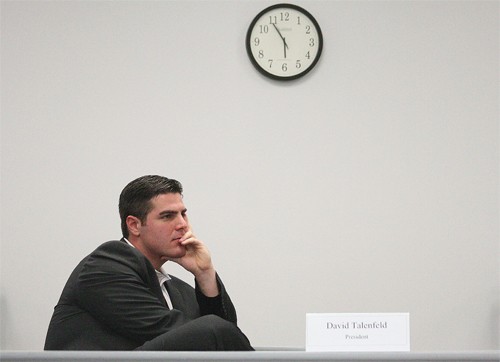In the midst of an ongoing campaign to discuss the UA transformation with a broad range of campus leaders, Provost Meredith Hay paid a visit last night to the graduate student governing body.
Hay entertained questions from Graduate and Professional Student Council representatives during an open floor session at the council’s biweekly meeting, the last of the semester. Most questions pertained to benefits for graduate students and the UA’s increasing dependence on tuition revenue.
The university is in a transitional period, Hay said, as it moves from being a “”state-supported”” school primarily dependent on state funding to a “”state-assisted”” school dependent primarily on tuition and other non-governmental revenue sources.
The university will have to carefully lie out its budget, she said, “”so that the ship stays on course. But we’re very frugal about how we spend our money.””
Rep. Lucy Blaney, a Spanish and Portuguese doctoral student, stressed to Hay the need to maintain what she described as the two most important benefits for graduate assistants: tuition remission and the current health care plan, adding that there is a dire need for a graduate assistant workload cap.
“”We’re fully aware that we’re an overworked, under-paid group,”” Blaney said, but called the three issues “”basic services and benefits that we actually need to survive.””
A request from Blaney for a commitment from the provost’s office to preserve these benefits was not directly granted.
“”We’ll call upon the graduate council as we design the budget for next year,”” Hay said.
Rep. James Johnson, an optical sciences doctoral student, questioned Hay about the possibility that the rising cost of health care benefits could increase the cost of hiring graduate assistants above that of post-doctoral students, effectively encouraging faculty to hire fewer graduate students in exchange for better-trained post-doctorates.
Hay responded by saying the university would need to subsidize these added costs from its general fund to prevent such hiring competition from taking place.
GPSC President David Talenfeld, a second-year law student, added that he had received assurances from graduate college administrators that the cost of graduate assistants would not be allowed to rise above that of post-doctorates.
“”They are unwilling to allow that to happen,”” he said.
“”Bill”” of rights changed to “”statement””
Rep. Priyanka Sundareshan, chair of the bill of rights subcommittee, announced the document would now be referred to as a “”statement of rights,”” to reflect its nature as legally non-binding.
The statement will go through another round of revisions at the subcommittee’s Dec. 8 meeting, she said.
Geography doctoral student Brian Marks, who spoke during the opening call to the audience, insisted that the statement include a stated workload cap for graduate assistants, especially teachers.
Graduate assistant workloads have reached a critical mass that has begun to effect the quality of undergraduate education, he said.
“”I’m sure we’ve only seen the tip of this iceberg as the budget crisis gets worse,”” he said.
Talenfeld that although progress on the statement has not proceeded as quickly as originally projected, he still hopes to have a concrete, approved document by the end of his tenure.
“”I think we need to resolve this once and for all,”” he said.









